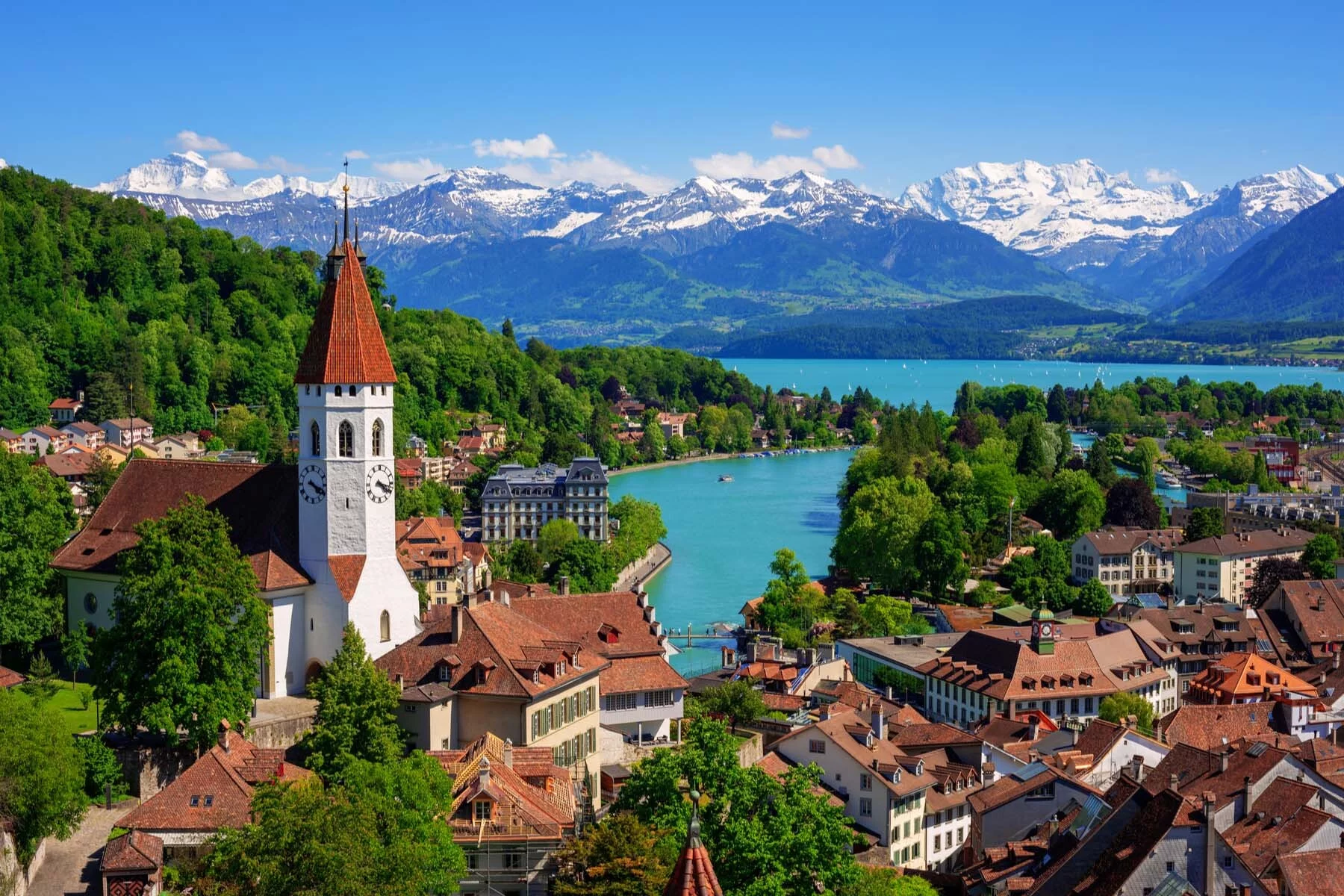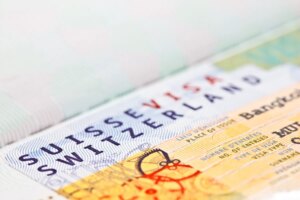When you’re trying to find a job or secure a work visa in Switzerland, you probably want to know how much you can expect to earn. After all, this country is famous for good salaries to offset its higher cost of living.
Here’s what you need to know about the minimum wage and average salary in Switzerland:
What is the minimum wage in Switzerland in 2025?
You might be surprised to learn that there is no nationwide minimum wage (Mindestlohn) in Switzerland.
In 2014, Swiss voters rejected a measure to introduce what would have been the highest minimum wage in the world – CHF 22 per hour or CHF 4,000 a month. Just over 75% of voters were against the legislation, and it remains a hot topic in the country to this day.

Despite the lack of nationwide support, several of the 26 Swiss cantons have passed their own minimum wage requirements:
| Canton | Minimum wage per hour |
| Basel-Stadt | CHF 22.00 (only applies in some sectors) |
| Geneva | CHF 24.48 |
| Jura | CHF 21.40 |
| Neuchâtel | CHF 21.09 |
| Ticino | CHF 20.00 (depending on the sector) |
Unfortunately, similar initiatives in Winterthur, Zurich, and Kloten were overturned by an administrative court in 2023.
What is the average salary in Switzerland?
Despite not having a national minimum wage, workers in Switzerland are among the highest-paid in the world. In 2023, the OECD reported that the average annual salary in Switzerland was around CHF 71,167 per year.
However, the alliance of supporters for a national standard says many workers are earning much less. For example, in 2020, 17,000 full-time workers in the city of Zurich earned around CHF 4,000 a month before deductions. The alliance, which includes many Swiss trade unions and employers associations, says the worst-paid professions include sales and courier services. It also disproportionately impacts women in the workforce, accounting for around two-thirds of those affected.
Average salary by sector in Switzerland
What you can expect to earn depends to a large extent on your sector. The Federal Statistical Office compiled the following average earnings according to the sector in 2022:
| Job sector | Avg gross monthly wage (CHF) |
| Accommodation and food service | 4,601 |
| Administrative and management consultancy | 9,856 |
| Arts, entertainment, and recreation | 6,887 |
| Construction | 6,551 |
| Financial and insurance activities | 10,491 |
| Human health and social work | 6,608 |
| Information and technology | 9,412 |
Average salary by job function in Switzerland
The table below shows some additional estimated average salaries for different jobs in Switzerland. These gross salary estimates from Lohncomputer are based on full-time contracts. However, remember that these average salaries will vary depending on your location. Typically, you’ll earn more in larger cities like Zurich and Basel than you would in more rural areas.
| Occupation | Annual salary (CHF) | Monthly salary (CHF) |
| Teacher | 87,500 | 7,292 |
| Marketing officer | 90,500 | 7,542 |
| Product manager | 105,000 | 8,750 |
| Nurse | 68,000 | 5,667 |
| IT systems specialist | 117,000 | 9,750 |
| Account manager | 95,550 | 7,963 |
| Postal worker | 66,600 | 5,550 |
| Graphic artist | 55,000 | 4,584 |
What else counts toward the average salary?
Of course, salary is not the only thing to consider when getting a job in Switzerland. There are many other workplace benefits you should factor in.

All Swiss employees are entitled to at least four weeks of holiday per year. Workers aged 20 and younger are entitled to five weeks. Other absences from work (e.g., accident, illness, or bereavement) are up to employers’ discretion. Many employers take out insurance to pay their employees 80% of their wages during prolonged absences. Employers pay for at least half of the amount of the premiums.
All employed mothers (full and part-time) receive 14 weeks of paid maternity leave. As of 1 January 2021, employed fathers can also receive paternity leave.
Salary checker in Switzerland
There are several ways to compare your salary in Switzerland. The State Secretariat for Economic Affairs (SECO) has an online national wage calculator that provides a view of typical salary ranges based on your sector, age, experience, and education level.
You can also compare your salary on sites such as Jobs.ch or Glassdoor.
The gender pay gap in Switzerland
Switzerland is behind many other European countries when it comes to women’s rights and gender equality. Women famously didn’t get the vote at the federal level until 1971. Although, policy changes are slowly making progress on this issue. The country was ranked 20th on the WEF 2024 Global Gender Gap Report.

The gender pay gap is particularly wide in Switzerland compared to other Western European countries. For example, in Italy, women earn 5% less than men, while in Switzerland, women’s paychecks are 19% lower than men’s.
A report by the Federal Office for Gender Equality reveals that 45.4% of this gap cannot be explained by factors such as professional status, years of service, or qualifications.
In the private sector, the average gender pay gap is 19.6%. Women in the public sector earn 18.1% less than men. The largest wage gap between men and women is found in eastern Switzerland (11.5%), while the smallest divide is in the Zurich region (7.6%).
Until recently, Switzerland did not have any legal measures in place to confront the gender pay gap. However, on 1 July 2020, a new rule under the Swiss Federal Act on Gender Equality (GEA) came into force. Now, companies employing 100 or more employees (full or part-time) must conduct a so-called internal analysis on wage equality.
If the analysis reveals an unexplained wage difference exceeding the threshold of 5%, the analysis has to be repeated after four years. However, this new legislation will expire automatically by 1 July 2032.
Salaries and wages for expats in Switzerland
Switzerland has experienced an immigration boom over the past 20 years. Of the nearly 9.0 million people living in Switzerland in 2023, about 27% were foreign nationals. More than two-thirds were from other European countries. Foreign nationals also account for 33.8% of the workforce.

However, that doesn’t mean finding a job as a foreigner is easy, even if you’ve secured a Swiss work visa or permit. The National Center of Competence in Research found that citizens with foreign backgrounds must submit 30% more applications than native Swiss candidates in order to be invited to a job interview. Furthermore, the rate of unemployment for foreign nationals is around two times higher than for Swiss nationals.
If you are searching for a well-paid job in Switzerland, you might want to look to the main driver of the Swiss economy – the services sector. The country also has one of the highest concentrations of Fortune 500 companies in the world.
What to do if your salary is below the minimum wage
The rules and penalties for labor disputes vary across the Swiss cantons. For instance, in Geneva, employers who do not pay the minimum wage face administrative fines. Repeated or very severe violations may result in harsher punishments.
If you’re not being paid the minimum wage in Geneva, you can report the offense to the Direction générale de l’office cantonal de l’inspection et des relations du travail (French), also known as OCIRT. For more information on employment-related issues, visit ch.ch.

Alternatively, workers who earn a minimum wage in Switzerland based on a collective bargaining agreement can contact their trade union or employers association. In a collective labor dispute involving several employees, cantonal conciliation boards handle the case. Federal employees should contact the responsible administrative office with a labor complaint.
If you feel that you are being discriminated against at work based on your gender, race, or disability, you can take legal action against your employer in a Swiss court.
Legal proceedings on the canton level are free of charge. However, you will have to pay lawyer’s fees. You can not be terminated from your employment as retaliation for your discrimination claim during this process or six months after conciliation or court proceedings.
The Swiss Gender Equality Act requires companies found guilty of gender-based pay discrimination to repay the wage difference.
Useful resources
- Ch.ch – official government website with information on working in Switzerland
- Federal Office for Gender Equality (FOGE) – official government website of the agency responsible for gender equality
- Federal work and income statistics – official government statistics portal








